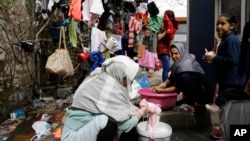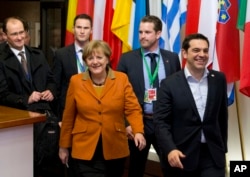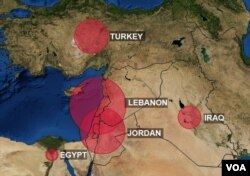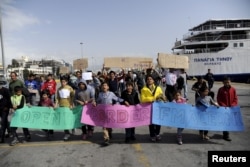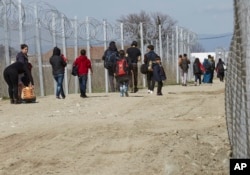The U.N. refugee agency said Tuesday it is concerned some parts of an EU-Turkey proposal to stem the flow of refugees and migrants into Greece, including a possible blanket return of individuals, may violate international law.
The U.N. refugee agency (UNHCR) said aspects of the proposed agreement need to be clarified. However, it said it is concerned about any arrangement that involves the blanket return of all individuals from one country to another.
EU leaders and Ankara said Tuesday they had reached a possible deal that would return the thousands of migrants arriving in Greece from Turkey. The leaders are confident a full agreement can be reached at a summit next week.
Possible agreement
After months of disagreements and increased bickering among the 28 EU nations, the leaders said they agreed to give Turkey more than $3 billion in additional funds to help with the nearly 3 million Syrian refugees it is hosting.
The EU leaders also agreed to swiftly ease visa requirements for Turks and speed up Ankara's EU accession talks in exchange for its help in stemming migration flows to Europe.
In addition, the deal calls for the EU to resettle one Syrian refugee from Turkey in return for every Syrian refugee Turkey takes back from Greece.
French President Francois Hollande said, "The summit has created hope that the refugee question can be dealt with through solidarity in Europe, and efficiency in cooperation with Turkey."
However, UNHCR refugee coordinator for Europe Vincent Cochetel, who said he is did not know the details of the proposed deal, told VOA he worries it may lack safeguards to protect asylum-seekers.
“Collective expulsion of foreigners is prohibited under the European Convention of Human Rights," Cochetel said. "An agreement that would be tantamount to a blanket return of any foreigners to a third country is not consistent with European law, is not consistent with international law.”
March 17 summit
All eyes are now on March 17 and the start of a two-day summit to finalize the commitment and agree on a deal that the leaders hope will allow for a return to normalcy along their borders by the end of the year.
But the difficulties in reaching a deal were underscored by the talks themselves, which lasted hours longer than initially scheduled
Turkish Prime Minister Ahmet Davutoglu cast the new Turkish proposal as a way to both rescue lives, staunch migrant trafficking and herald "a new era in EU-Turkish relations."
But deep divisions remain over finding a solution to Europe's biggest refugee crisis since World War II.
Last year, more than 1 million refugees and migrants made the perilous journey across the Mediterranean Sea from Turkey to Europe, and roughly 142,000 have arrived so far this year, most of them arriving in Greece.
The Turkish coast guard is reportedly intercepting would-be migrants on an irregular basis in an effort to discourage human smugglers.
Rights protections
Cochetel tells VOA he has no objection to interceptions in Turkish territorial waters, as long as those aboard are able to access protection.
“We know that 91 percent of the people arriving in Greece are Afghans, Iraqis and Syrians fleeing for their lives, fleeing because of the conflict or fleeing because of the human rights violations in their country,” he said.
“They are not people that are looking for a better economic future. They are people that are fleeing those conflicts that are still unsolved today,” Cochetel added.
The UNHCR urges European leaders to ensure the plan includes proper legal safeguards for refugees before they meet next week to finalize the deal with Turkey.
Beyond differences with Turkey, EU countries are split among themselves over how to handle the crisis, as some countries install border controls while others — notably Germany and Sweden — call for a more humanitarian approach. Those differences were on display during an EU summit last month, when leaders failed to make any headway on the migrant issue.
New spats have flared up, including between France and Belgium over the fate of asylum-seekers in Calais — which has also been a longstanding bone of contention between France and Britain, the ultimate destination of many.
Little progress
Even some areas of agreement — such as the voluntary resettlement of roughly 160,000 asylum-seekers — have shown little progress on the ground.
"There is a lack of political willingness to implement the decisions that have been taken," said Sergio Carrera, senior research fellow for the Center for European Policy Studies in Brussels. He said he was baffled by the EU's inaction toward asylum-seekers, many of whom come from conflict-torn countries such as Iraq, Syria or Afghanistan.
Arriving at the talks Monday, Greek Prime Minister Alexis Tsipras — whose country is on the front lines of the migrant influx — called on fellow EU members to honor their resettlement agreement.
"This is a European problem, so we have to find collective solutions to this problem," Tsipras said.
Some governments, however, seem opposed to following even already-existing rules, Carrera said.
"These include basic human rights of the people arriving,” he said. “Then they want to rewrite their rules according to their own wishes."
But, Carrera added, "a union cannot function like this."
Thousands stalled
Meanwhile, thousands of migrants are now stuck in Greece since non-EU member Macedonia blocked their passage northward as part of a domino series of border controls established by Balkan countries.
And more keep arriving — or lose their lives trying to do so. At least 18 asylum-seekers drowned off the Turkish coast Sunday, according to news reports.
Ahead of the Brussels meeting, Human Rights Watch warned that a potential deal with Ankara would mean a "flawed and potentially dangerous policy to refugee flows" across the Aegean.
"EU leaders are in a panic to stop refugee flows before spring," senior Human Rights Watch official Judith Sunderland said, "and they seem willing to throw human rights overboard in the process."




